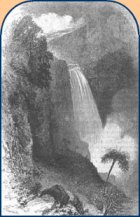
| Who never lost, is unprepared A Coronet to find. Who never thirsted, Flagons, and Cooling Tamarind. Who never climbed the weary league - Can such a foot Explore The purple Territories On Pizarro's shore? How many legions overcome - The Emperor will say? How many Colors taken On Revolution Day? How many Bullets bearest? Hast thou the Royal Scar! Angels! Mark "Promoted" On this soldier's brow! Emily - |
 |
 |
 |
NOTES Tamarind: "a tree of the genus Tamarindus, which yields fruit called Tamarinds. Two species are recorded, one of which is a native of the East Indies and of Arabia and Egypt, the other a native of the West Indies and South America. It is cultivated in both for the sake of its pods, and for its cooling, acidic fruit, the pulp of which, dried either alone or with salt, or mixed with boiling sugar, is imported to northern countries. The stem of the tree is lofty, large, and crowned with spreading branches" (Webster's Dictionary, 1856). Pizarro's shore: Francis Pizarro was a cavalier from Spain who led numerous military expeditions into regions of South America not yet explored by colonial powers. The following excerpt from Prescott's History of the Conquest of Peru describes the first landing of Pizarro and his ocean-weary crew on a South American shore. "... the little vessel entered the river Biru, the misapplication of which name is supposed by some to have given rise to that empire of the Incas. After sailing up this stream for a couple of leagues, Pizarro came to anchor, and disembarking his whole force except the sailors, proceeded at the head of it to explore the country. The land spread out into a vast swamp, where the heavy rains had settled into pools of stagnant water, and the muddy soil afforded no footing to the traveller. This dismal morass was fringed with woods, through whose thick and tangled undergrowth they found it difficult to penetrate; and emerging from them, they came out on a hilly country, so rough and rocky in its character, that their feet were cut to the bone, and the weary soldier, encumbered with his heavy mail or thick-padded doublet of cotton, found it difficult to drag one foot after the other. The heat at times was oppressive; and, fainting with toil and famished for want of food, they sank down on the earth from mere exhaustion. Such was the omnious commencement of the expedition to Peru" Prescott, History of the Conquest of Peru, 839). Revolution Day: This could refer to the resistance shown
by native Peruvians to the Spanish colonial power. This kind of
resistance continued throughout Spain's colonial occupation of
Peru, which ended in revolution in 1822, just years before Dickinson's
birth. "As Peru had always shown a spirit of insubordination,
which required a more vigorous interposition of authority than
was necessary in the other colonies, it was resolved to send a
viceroy to that country, who should display a state and be armed
with powers, that might make him a more fitting representative
of the sovereign. He was to be accompanied by a Royal Audience,
consisiting of four judges, with extensive powers of jurisdiction,
both criminal and civil, who, besides a court of justice, should
constitute a sort of council to advise with and aid the viceroy.
The Audience of Panama was to be dissolved, and the new tribunal,
with the vice-king's court, was to be established at Los Reyes,
or Lima, as it now began to be called, --henceforth the metropolis
of the Spanish empire on the Pacific. Such were some of
the principal features of this remarkable code, which, touching
on the most delicate relations of society, broke up the very foundations
of property, and, by a stroke of the pen, as it were, converted
a nation of slaves into freemen. It would have required,
we may suppose, but little forecast to divine, that in the remote
regions of America, and especially in Peru, where the colonists
had had been hitherto accustomed to unbounded license, a reform,
so salutory in essential points, could be enforced thus summarily
only at the price of a revolution.-- Yet the ordinances received
the sanction of the emperor that same year, and in November, 1543,
were published at Madrid" (Prescott, 1124-1125). |
